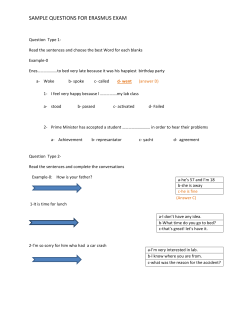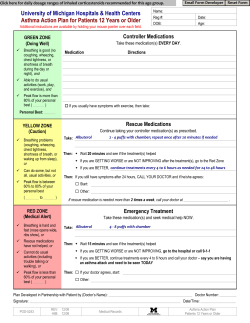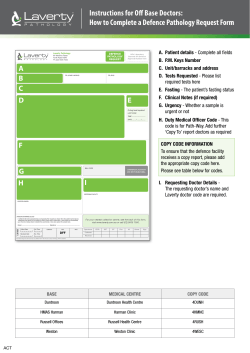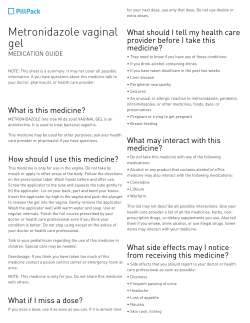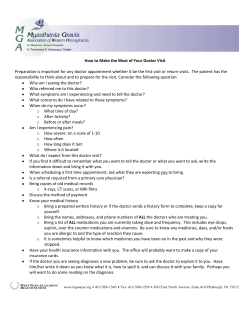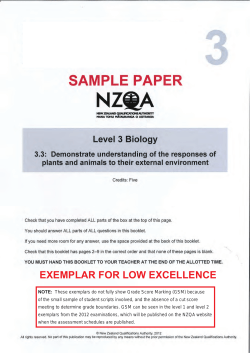
Emedica MRCGP CSA Sample Cases – Guidelines for authors
Emedica MRCGP CSA Sample Cases – Guidelines for authors We require original CSA cases that are at the same standard as the real CSA examination. A sample case template is shown at the end of this guidance. All cases and mark schemes MUST be original – we cannot accept any real CSA cases, or any cases that are derived from any other published source (whether online or in print). Payment / Batches A batch of CSA cases consists of 5 (FIVE) CSA cases. Each case consists of a patient ’s sheet, a doctor’s sheet, and the examiner’s sheets with specific marking criteria for the 3 assessed domain, and examination findings. Payment is as follows: 1 batch of 5 (FIVE) CSA cases: £300.00 Doctor Sheet – Case 1 You are a locum General Practitioner who has recently finished training. Name James Mahoney Date of birth / Age 68 Address: 52 Acacia Avenue Social History: Married Past medical history: Type 2 diabetes Hypertension Current medication: Metformin 500mg TDS Lisinopril 10mg od Recent consultations: 2 weeks ago: Diabetic annual review with nurse: examination normal, blood pressure 135/72. Bloods requested. Blood results: HbA1c Urea and Electrolytes 7.3% Within normal range Patient Sheet – Case 1 Name James Mahoney Gender Male Age 68 Background: You are a 68 year old retired architect. You are married to Winnie Mahoney, who is 65. You attended two weeks for your annual diabetic check. Your opening line: “I had a bit of a funny turn yesterday…and I’m quite worried” ONLY GIVE THE INFORMATION BELOW IF ASKED RELEVANT QUESTIONS Symptoms Your wife mentioned that your speech was slurred during dinner – “She said I sounded like I was drunk”. You had had a glass of wine with your meal. You also noticed your left arm felt weak – you dropped a pan when trying to clear up after dinner. You have never had these symptoms before. You did not feel dizzy or lightheaded. You have not felt sick or vomited. You did have a mild headache, but put this down to being tired. All your symptoms were better by the time you went to bed – about 2 hours after dinner. You woke this morning feeling absolutely fine. You sometimes forget to take your medications. If asked a relevant question, mention that: Family History Your father died of a heart attack aged 60. There is no family history of stroke. Social History You live with your wife. She was diagnosed with breast cancer 2 months ago, and is currently undergoing chemotherapy – you drive her to appointments about an hour away three times a week. Lifestyle You drink a small glass of wine most evenings with dinner. You sometimes drink a bit more if at a party or when dining out (2-3 glasses). You smoke 10 cigarettes a day and have done for over 40 years. You enjoy this and have never tried or wanted to give up. You are fairly active, and spend about an hour every day gardening. You used to go walking with your wife a lot, but since your wife started treatment for her cancer, she is tired a lot and you tend to stay in more. You normally eat healthy food, but since your wife has been unwell, she has been t oo tired to cook most days, and you have been eating a lot more take away food. Ideas, Concerns, Expectations You think that this might be an early warning sign for a stroke. You are worried that this could be the first episode of many and that things might get worse in the future. You are quite worried and stressed about your wife’s illness. If told that you should not drive for 4 weeks, then you become worried about how you will get your wife to her appointments. You want to know what is going on, and whether you need to have any tests to confirm a cause for your symptoms. Behaviour You are quite anxious because of your worries. You are co-operative and non-demanding. If the doctor explains the reasons it is not safe for you to drive, you are willing to accept this. Notes: If the doctor asks to examine you, ask them “what do you want to examine?” If the doctor wishes to discuss your diabetes, mention that you sometimes miss your evening tablet, and that you do enjoy a sweet dessert once in a while. You did not come to discuss this, so only go into this if the doctor specifically asks about it. Examiner Sheet - Examination Findings Case 1 If the doctor asks to examine the relevant areas, provide these findings: BP – 150/80 Pulse 80, sinus rhythm No neurological abnormalities, Cranial nerves intact No bruit Examiner Sheet – Case 1 Mark Sheet Domain Data Observed Behaviours Takes a detailed history including: o nature and duration of symptoms – gathering speech, weakness Clear Pass Pass o risk factors for stroke - FH, smoking of stroke (e.g. ABCD2) Fail Clear Fail Uses recognised risk score to establish risk Examination requested includes neuro + cranial nerves + check for bruit + pulse / BP Cranial nerve examination performed proficiently Asks about driving status Clinical Makes a diagnosis of TIA management Starts Aspirin 300mg Arranges specialist assessment within 24hrs Discusses risk reduction – smoking, Clear Pass Pass cholesterol testing Fail Clear Fail Explains the patient should not drive for 4 weeks Safety netting – explains the need to call “999” if any new weakness or speech disturbance Interpersonal Explores the cue “and I’m quite worried” and acknowledges patient’s worries about skills possible diagnosis and risk of future Clear Pass Pass Fail Clear Fail Total Score: problems. Explores social issues – re: caring for wife Explains diagnosis of TIA clearly Explains risk / risk factors clearly Explains need to stop driving sensitively Engages and involves patient throughout Comments
© Copyright 2025

